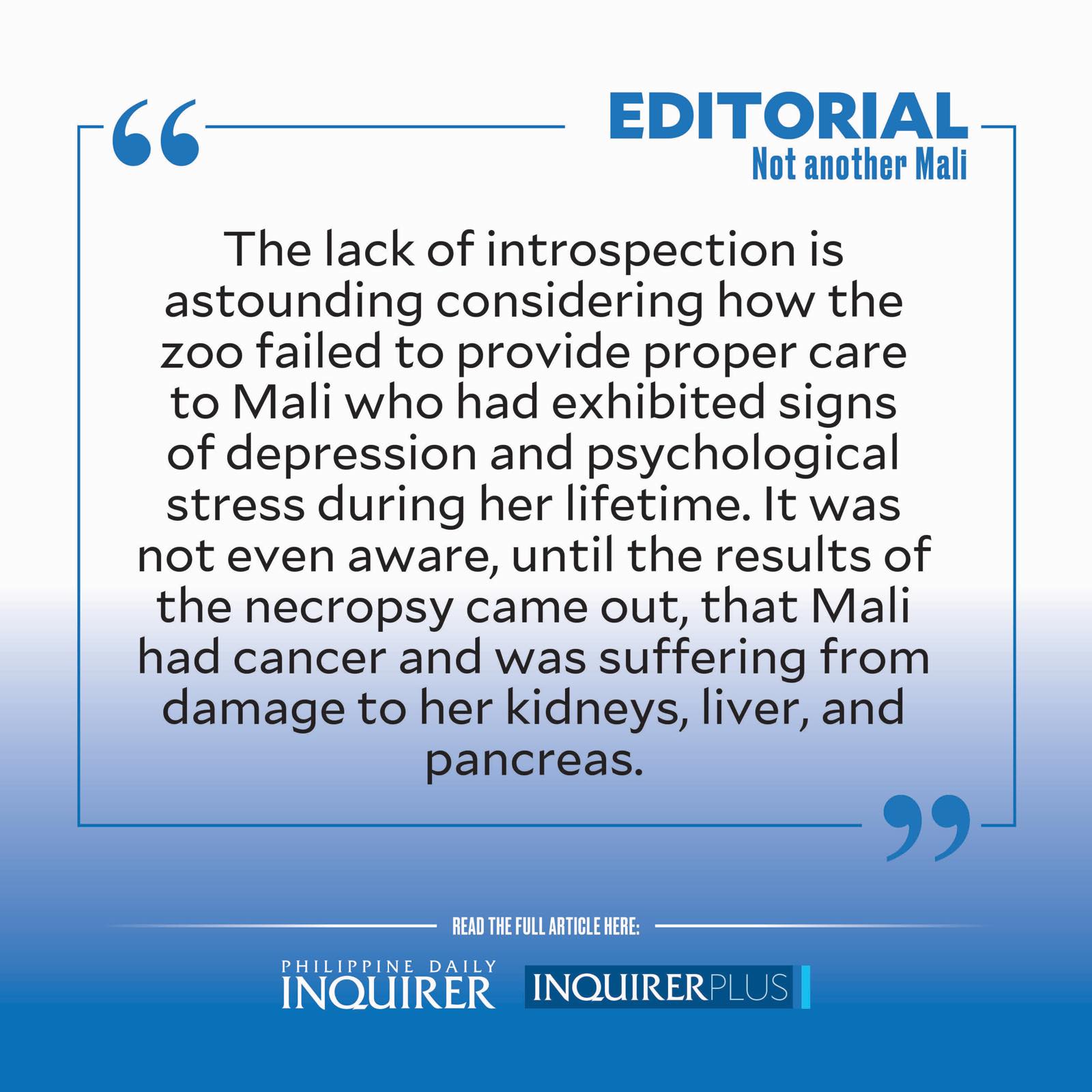Not another Mali

Mali, dubbed as one of the world’s saddest elephants, died last week after more than four decades of being confined alone inside Manila Zoo. The 43-year-old elephant died of congestive heart failure.
As soon as the necropsy was released on Wednesday, the Manila government announced it was considering taking up Sri Lanka’s offer for another elephant to replace Mali. The lack of introspection is astounding considering how the zoo failed to provide proper care to Mali who had exhibited signs of depression and psychological stress during her lifetime. It was not even aware, until the results of the necropsy came out, that Mali had cancer and was suffering from damage to her kidneys, liver, and pancreas.The zoo also ignored appeals—for years—from animal welfare activists to release the elephant to a sanctuary in Thailand where she could have lived in a proper environment. Manila Mayor Honey Lacuna said the transfer was “never considered” because the animal might not have been able to “[adapt] to the new environment” considering she has lived in captivity for decades, a position that was supported by other animal activists who believed that it would have put Mali under much stress.
Article continues after this advertisementGlobal campaignBut animal rights group People for the Ethical Treatment of Animals (Peta), which led a global campaign in 2013 to release Mali, said going to a sanctuary could have allowed the animal to enjoy the company of other elephants. Peta condemned Manila Zoo for its indifference and greed causing Mali “[to die] the same way she had lived for nearly 50 years: alone in a concrete pen at the Manila Zoo.”
Mali was brought to the Philippines from Sri Lanka in 1977 and was turned over to the Manila government in 1981. The elephant was Manila Zoo’s oldest resident and has been an integral memory for young students or families on educational field trips or family outings. Dr. Heinrich Patrick Peña-Domingo, the zoo’s chief veterinarian, said Mali was not really alone because he and her caretakers served as family. This is naive reasoning as it invalidates the animals’ need to live in a natural habitat where they can forage for food and have adequate space. While the zoo may have provided food and care, videos have shown Mali pacing back and forth in her barren concrete enclosure in solitude.
Solitary confinementOn its website, Peta stated: “Mali was still a nursing baby when she was taken from her home in Sri Lanka, where she was just learning how to swim, roughhouse with her cousins, and find her own food. The Manila Zoo and the city of Manila sentenced Mali to decades of solitary confinement, which is torturous for female elephants, who naturally would spend their lives among their mothers and sisters, protecting one another and raising each other’s calves.
Article continues after this advertisement“Due to the fact that there is no elephant expert in the country, Mali was never provided with routine veterinary care—something she would have been given at the sanctuary Peta was prepared to transfer her to. Every person who denied her veterinary care and blocked her transfer to a sanctuary should be held accountable for their part in allowing Mali’s suffering.”
And now, the Manila government and zoo authorities, despite the abysmal treatment of Mali, even have the audacity to bring in another elephant that will be subjected to the same solitary and lonely life.
“Bakit pa tayo magdadala para ganun din ang mangyari sa kanya katulad ng nangyari kay Mali, ilang years, ilang decades of loneliness, of solitary confinement na nakatayo sa semento na walang kahit anong interactions with other elephants na pinakamahalaga para sa mga elepante (Why would we do that to another elephant who would end up like Mali—decades of loneliness and solitary confinement with just standing on concrete without any interactions with other elephants which is very important to them),” Peta animal rescue manager Jana Sevilla asked in a TV interview.
Petition to shut down Manila ZooA petition started on change.org last Thursday has called on authorities to shut down Manila Zoo permanently, citing its inadequate facilities and poor animal care practices. “Although it has undergone major renovations due to rising complaints, a truly noteworthy effort, there seems to be a pattern of renovating and getting new attention, and then slowly deteriorating again. One must ask, ‘Is a bustling city really the right place for these animals?’” the petition said.
Zoos provide entertainment and educate the public about endangered species, and recent trends have been geared toward recreating natural habitats and providing animals more space. But there are other ways to learn about animals and nature such as through books or videos. As actress Bela Padilla asked on X (formerly Twitter): “What satisfaction do you get from seeing an animal caged up?”The Manila government should rethink its plan to bring in another elephant. Instead, it must ensure that the zoo meets standards in providing better living conditions and veterinary care for the animals it currently hosts. No more animals should suffer the way Mali did.
















